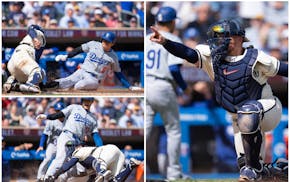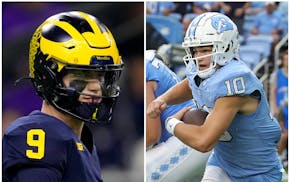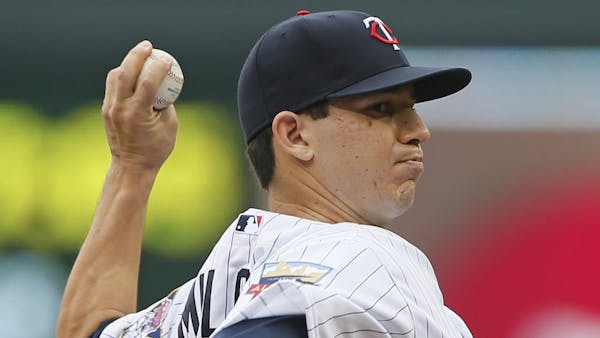FORT MYERS, FLA. – Trevor Plouffe turns 29 in June and is entering his 12th season of professional baseball.
He's not naïve about the business.
Nor is he hard of hearing.
Plouffe insists he doesn't pay any attention to outside noise, but let's be honest, that noise is impossible to ignore. Sounds something like this:
MIGUEL SANO IS COMING TO HELP SAVE THE DAY!
Sano is regarded as a can't-miss prospect, a baseball wunderkind, a savior. Twins fans see rainbows and lollipops while envisioning the day Sano strolls into town to bash home runs and lead the organization out of an abyss.
Sano plays third base. Plouffe plays third base.
There's only one third base.
Baseball is hard enough without worrying about that fast-approaching object on the horizon.
"You can't think about anything like that," Plouffe said. "You can't worry about what other people are saying about you. I'm more focused on getting this organization out of this rut that we've dug ourselves over the last four years."
That's the ironic part of the Sano waiting game: Once a liability in the field, Plouffe has turned himself into a dependable third baseman and productive hitter the past few seasons.
Give the guy credit for handling a potential uncomfortable situation in a positive manner. Rather than become distracted or irritated by all the longing for Sano's arrival, Plouffe acknowledged his flaws and made necessary adjustments to become a more complete player.
"For me, one was his unfailing desire to get better," manager Paul Molitor said.
Plouffe's comfort level at third base is reflected in his defensive improvement, which is evident both visually and in advanced statistical metrics. And at the plate, he posted career highs in hits, doubles, RBI (80), runs scored and walks last season.
He finally looks settled.
"When you first come up, it's, 'Do I belong here? Can I stay here?' " Plouffe said. "You have to realize that if you're here, you have the ability."
Plouffe's problem was finding a home. He hopscotched from one position to another — shortstop, second, outfield — before shifting to third base permanently in 2012.
He frustrated the team by making 17 errors in 95 games that season, and the clock on his tenure inched closer to midnight.
"We were running out of spots [for him to play]," General Manager Terry Ryan said.
Plouffe blamed his struggles on bringing shortstop habits to third base. He often took bad angles, a flaw compounded by errant throws and bad positioning.
He butchered plays like a meat cleaver in the field.
"I had to learn how to play third base in front of everybody," he said. "Kind of trial by fire."
Plouffe recognized his opportunity with this organization was slipping away, and he took ownership of learning his position.
He focuses on his footwork, agility and hands in the offseason. Twins coaches spend time with him every day on his positioning and his awareness of situations and hitters' tendencies.
"Those are areas you can improve on if you commit to it," Molitor said. "He was an easy guy to get pecked at when he came up — 'He wasn't athletic enough to play short, try him in the outfield, got him to third base, doesn't have any range" — all those things. I don't think it really wears on him anymore because I think he's pretty comfortable in his own skin. A young player trying to get established, I'm sure some of those took a toll."
Ryan listed three one-word reasons when asked about Plouffe's improvement: Familiarity, maturity, urgency.
All of those are equally important but urgency cuts to the heart of Plouffe's situation. He's not a young prospect any more. He's entering his prime. He needed to find a position and establish himself as a player.
Sano's towering presence in the shadows made that urgency feel more real.
Sano looks like a future star, but he still has to prove himself, first in Class AA to start the season and as he makes his way up the ladder. Nothing is guaranteed though.
Nobody can predict injuries, or Sano's exact timeline.
Smart baseball people project great things from him, and the Twins are banking on that outcome.
If Plouffe hears the noise, if he feels that wave of anticipation, he doesn't act bothered by it. He can only control how he plays. The rest will be decided in time.
"I know that if I continue to work hard and improve," Plouffe said, "I'm going to have a job somewhere."
Chip Scoggins chip.scoggins@startribune.com
Scoggins: 'Wait one more year' can't be the Wild's plan. Thankfully, it isn't.

Scoggins: Finch feeling heat of the Suns as playoff battle looms
Scoggins: Why 'championship or bust' fits these Wolves

Scoggins: Anatomy of a game-saving play as Correa throws out Ohtani


